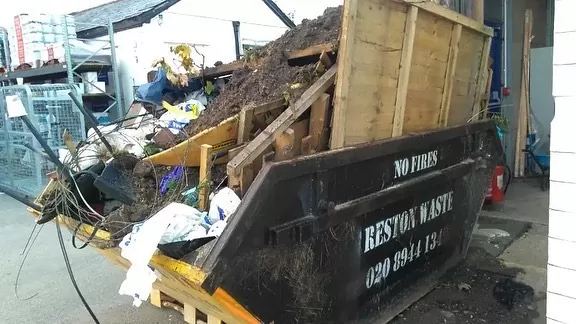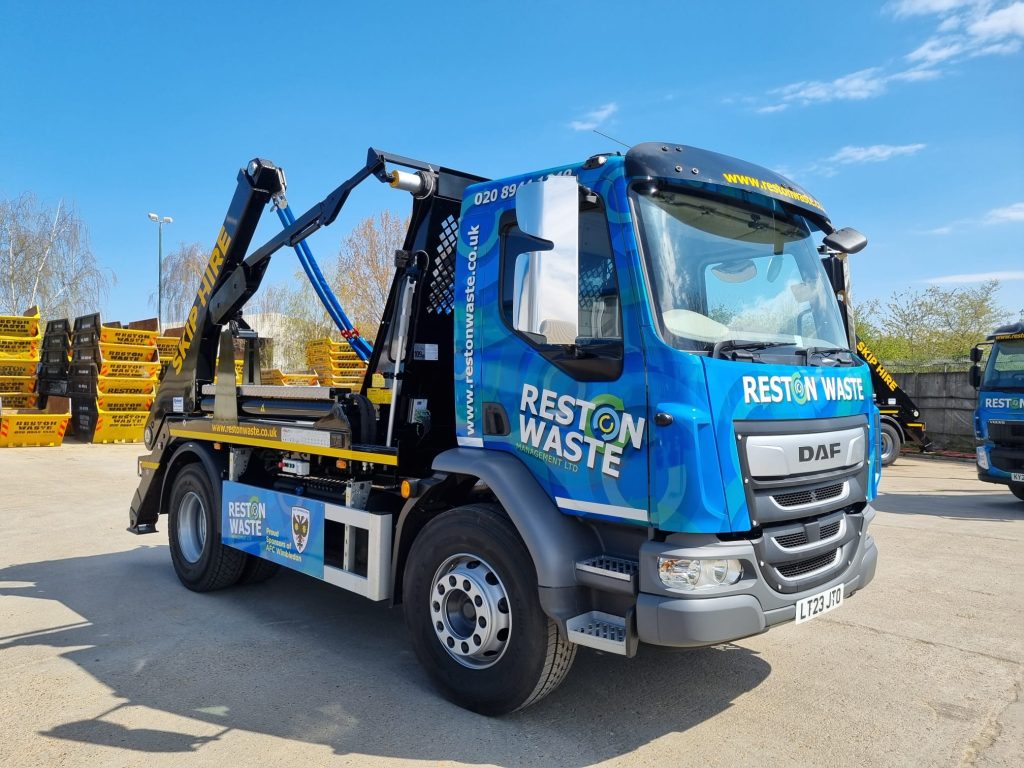Skip Loading Tips: Avoid Overloaded Skips
When it comes to waste disposal, hiring a skip is an excellent solution for both residential and commercial projects. Skips provide a convenient and efficient way to get rid of large amounts of rubbish in a swift and legal fashion. However, it’s crucial to use them correctly and avoid overloading them. Overfilled skips can pose safety hazards and cause a general inconvenience for you, your skip hire company and the general public.
In this article, we’ll provide you with essential skip-loading tips to help you fill your skip effectively while preventing overloading. We’ll also look at some of the other crucial aspects of this topic, such as the potential dangers.

How to fill a skip effectively
Efficiently filling a skip not only maximises its capacity to help save you money, but also ensures safe and secure waste disposal. Here are some tips to help you fill a skip effectively:
- Organise your waste: Sort your waste into different categories such as general waste, recyclables and hazardous materials. This will make it easier to dispose of each type appropriately. Don’t forget, you can’t put hazardous waste in a skip!
- Break down large items: Disassemble or break down large items such as furniture, wooden pallets or branches to make the most of the available space in the skip.
- Use a step-by-step approach: Fill the skip evenly, starting with putting larger and heavier items at the bottom. Place smaller items on top to fill any gaps and ensure a compact load that maximises space.
- Flatten bulky items: Flatten cardboard boxes, dismantle wooden structures, and compress bulky waste to minimise void spaces.
- Use the space wisely: Fill in the gaps and crevices with smaller items or loose waste. This helps prevent wasted space and ensures efficient utilisation of the skip’s capacity.
How to avoid overloading a skip
Overloading a skip can lead to safety risks, legal issues, and additional costs. Follow these guidelines to avoid overloading your skip:
- Know the weight limit of your skip: Every skip has a weight limit specified by the skip hire company. Make sure you are aware of this limit and do not exceed it.
- Don’t fill the skip above the rim: It is crucial not to overfill the skip and to ensure that the waste does not exceed the rim or top edges. Overfilled skips can pose hazards during transportation for our drivers and other road users.
- Distribute weight evenly: Spread the weight of the waste as evenly as you can throughout the skip to maintain balance and stability.
- Consult your skip hire company: If you are unsure about weight limits or filling guidelines, reach out to us, your local London skip hire company, for clarification and advice and we’ll be happy to help.
- Choose waste collection: If a skip isn’t going to be big enough or convenient for you, then choose a waste collection or waste removal service instead This service will offer the same results without having to worry about overloading a skip.
How high can I fill a skip?
The maximum fill level of a skip depends on its size and the regulations set by the company you’re hiring from. As a general rule of thumb, skips should not be filled above the top edges or the rim. Exceeding the fill level can make transportation unsafe and may result in additional charges or refusal to collect the skip.
This can obviously create both a delay and extra costs, so it’s worth paying attention to the rules and sticking to them.
The dangers of overloading a skip
Overloading a skip brings with it a number of dangers, not just for you but for others. Here are the most common dangers of overloading:
- Instability: An overloaded skip may become unstable, increasing the risk of it tipping over during loading, unloading or transportation.
- Injury risks: Overfilled skips make it difficult to cover the waste securely, increasing the chances of sharp or protruding objects causing injuries.
- Legal implications: Overloading a skip is against regulations in many areas, and you may face penalties or fines if found in violation.
- Environmental impact: Overfilled skips may result in waste falling out during transportation, causing littering and harm to the environment.
What happens if I overfill a skip?
As mentioned above, there are legal ramifications for overloading a skip as the person responsible. In addition, skip hire companies who operate a reliable and trusted service will not want to fall foul of regulations, meaning you’re likely to see your skip refused for collection, leaving you with additional charges.
Make sure you choose the right skip size

Selecting the appropriate skip size for your project is the vital first step to avoid overloading. If you’re unsure about the skip size you need, consult your skip hire company for guidance. Remember, it’s better to choose a slightly larger skip than to risk overloading a smaller one.
By following these skip-loading tips, you can ensure safe and efficient waste disposal without the hazards and inconveniences of overloading. Prioritise organisation, proper filling techniques and compliance with weight limits and regulations. Remember, a well-loaded skip makes waste management easier and contributes to a cleaner environment.
For reliable skip hire services in Wimbledon and London, along with expert advice on skip loading, contact us at Reston Waste. Our experienced team is here to assist you in choosing the right skip size regardless of whether you’re clearing out your garden ready for the summer or carrying out large commercial development work.
Call today to book your skip or to ask for our expert advice.




